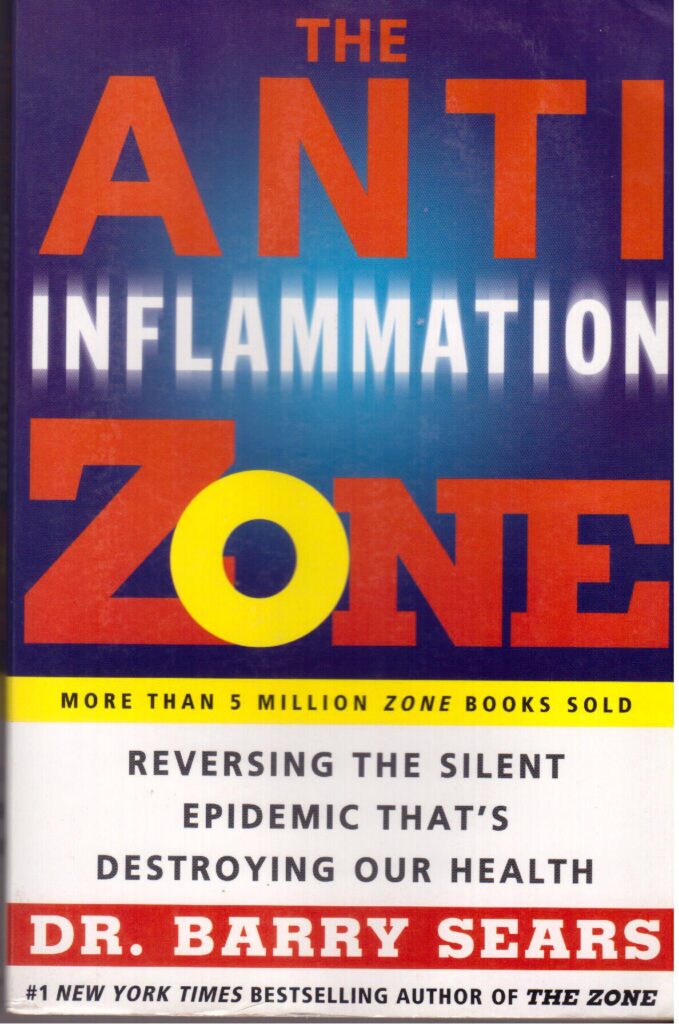Έρευνες
- Hotamisligil GS. “Foundations of immunometabolism and implications for metabolic health and disease.” 2017 Sep 19;47(3):406-420.
- Canto C and Auwerx J. “Calorie restriction: Is AMPK the key sensor and effector?” Physiology 26: 214-224 (2011)
- Lin SC and Hardie GD. “Sensing glucose as well as cellular energy status.” Cell Metab 27: 299-313 (2018)
- Sears B, Perry M, and Saha AK. “Dietary technologies to optimize healing from injury-induced inflammation.” Antiinflamm Antiallergy Agents Med Chem 20: 123-131 (2021)
- Sears B and Saha AK. “Dietary control of inflammation and resolution.” Frontiers Nutr 8: 709435 (2021)
- Meeuwsen S, Horgan GW, and Elia M. “The relationship between BMI and percent body fat, measured by bioelectrical impedance, in a large adult sample is curvilinear and influenced by age and sex.” Clin Nutr 29: 560-566 (2010)
- Markovic TP, Jenkins AB, Campbell LV, Furler SM, Kraegen EW, and Chisholm DJ. “The determinants of glycemic responses to diet restriction and weight loss in obesity and NIDDM.” Diabetes Care 21: 687-694 (1998)
- Ludwig DS, Majzoub JA, Al-Zahrani A, Dallal GE, Blanco I, and Roberts SB. “High glycemic index foods, overeating, and obesity.” Pediatrics 103: E26 (1999)
- Agus MS, Swain JF, Larson CL, Eckert EA, and Ludwig DS. “Dietary composition and physiologic adaptations to energy restriction.” Am J Clin Nutr 71: 901-907 (2000)
- Dumesnil JG, Turgeon J, Tremblay A, Poirier P, Gilbert M, Gagnon L, St-Pierre S, Garneau C, Lemieux I, Pascot A, Bergeron J, and Despres JP. “Effect of a low-glycaemic index-low-fat-high protein diet on the atherogenic metabolic risk profile of abdominally obese men.” Br J Nutr 86: 557-568 (2001)
- Parker B, Noakes M, Luscombe N, and Clifton P. “Effect of a high-protein, high–monounsaturated fat weight loss diet on glycemic control and lipid levels in type 2 diabetes” Diabetes Care 25: 425-430 (2002)
- Layman DK, Shiue H, Sather C, Erickson DJ, and Baum J. “Increased dietary protein modifies glucose and insulin homeostasis in adult women during weight loss.” J Nutr 133: 405-410 (2003)
- Layman DK, Boileau RA, Erickson DJ, Painter JE, Shiue H, Sather C, and Christou DD. “A reduced ratio of dietary carbohydrate to protein improves body composition and blood lipid profiles during weight loss in adult women.” J Nutr 133: 411-417 (2003)
- Gannon MC, Nuttall FQ, Saeed A, Jordan K, and Hoover H. “An increase in dietary protein improves the blood glucose response in persons with type 2 diabetes.” Am J Clin Nutr 78: 734-741 (2003)
- Pereira MA, Swain J, Goldfine AB, Rifai N, and Ludwig DS. “Effects of a low-glycemic load diet on resting energy expenditure and heart disease risk factors during weight loss.” JAMA 292: 2482-2490 (2004)
- Johnston CS, Tjonn SL, and Swan PD. “High-protein, low-fat diets are effective for weight loss and favorably alter biomarkers in healthy adults.” J Nutr 134: 586-591 (2004)
- Pittas AG, Das SK, Hajduk CL, Golden J, Saltzman E, Stark PC, Greenberg AS, and Roberts SB. “A low-glycemic load diet facilitates greater weight loss in overweight adults with high insulin secretion but not in overweight adults with low insulin secretion in the CALERIE Trial.” Diabetes Care 28: 2939-2941 (2005)
- Fontani G, Corradeschi F, Felici A, Alfatti F, Bugarini R, Fiaschi AI, Cerretani D, Montorfano G, Rizzo AM, and Berra B. “Blood profiles, body fat and mood state in healthy subjects on different diets supplemented with omega-3 polyunsaturated fatty acids.” Eur J Clin Invest 35: 499-507 (2005)
- Johnston CS, Tjonn SL, Swan PD, White A, Hutchins H, and Sears B. “Ketogenic low-carbohydrate diets have no metabolic advantage over non-ketogenic low-carbohydrate diets.” Am J Clin Nutr 83: 1055-1061 (2006)
- Pittas AG, Roberts SB, Das SK, Gilhooly CH, Saltzman E, Golden J, Stark PC, and Greenberg AS. “The effects of the dietary glycemic load on type 2 diabetes risk factors during weight loss.” Obesity 14: 2200-2209 (2006)
- Gannon MC and Nuttall FQ. “Control of blood glucose in type 2 diabetes without weight loss by modification of diet composition.” Nutr Metab 3:16 (2006)
- Giusti J and Rizzott J. “Interpreting the Joslin Diabetes Center and Joslin Clinic clinical guideline for overweight and obese adults with type 2 diabetes.” Curr Diab Report 6: 405-408 (2006)
- Johnston CS, Tjonn SL, Swan PD, White A, and Sears B. “Low-carbohydrate, high-protein diets that restrict potassium-rich fruits and vegetables promote calciuria.” Osteoporos Int 17:1820-1821 (2006)
- Ebbeling CB, Leidig MM, Feldman HA, Lovesky MM, and Ludwig DS “Effects of a low-glycemic load vs. low-fat diet in obese young adults: a randomized trial.” JAMA 297: 2092-2102 (2007)
- White AM, Johnston CS, Swan PD, Tjonn SL, and Sears B. “Blood ketones are directly related to fatigue and perceived effort during exercise in overweight adults adhering to low-carbohydrate diets for weight loss: a pilot study.” J Am Diet Assoc 107: 1792-1796 (2007)
- Hamdy O. “Diabetes weight management in clinical practice—the Why Wait model,” US Endocrinology 4: 49–54 (2008)
- Hamdy O and Carver C. “The Why WAIT program: Improving clinical outcomes through weight management in type 2 diabetes.” Curr Diab Rep 8: 413-420 (2008)
- Lasker DA, Evans EM, and Layman DK. “Moderate carbohydrate, moderate protein weight loss diet reduces cardiovascular disease risk compared to high carbohydrate, low protein diet in obese adults: A randomized clinical trial.” Nutr Metab 5: 30 (2008)
- Layman DK, Evans EM, Erickson D, Seyler J, Weber J, Bagshaw D, Griel A, Psota T, and Kris-Etherton P. “A moderate-protein diet produces sustained weight loss and long-term changes in body composition and blood lipids in obese adults.” J Nutr 139: 514-521 (2009)
- Jenkins DJ, Wong JM, Kendall CW, Esfahani A, Ng VW, Leong TC, Faulkner DA, Vidgen E, Greaves KA, Paul G, and Singer W. “The effect of a plant-based low-carbohydrate diet on body weight and blood lipid concentrations in hyperlipidemic subjects.” Arch Intern Med 169: 1046-1054 (2009)
- Evangelista LS, Heber D, Li Z, Bowerman S, Hamilton MA, and Fonarow GC. “Reduced body weight and adiposity with a high-protein diet improves functional status, lipid profiles, glycemic control, and quality of life in patients with heart failure: a feasibility study.” J Cardiovasc Nurs 24: 207-215 (2009)
- Pearce KL, Clifton PM, and Noakes M. “Egg consumption as part of an energy-restricted high-protein diet improves blood lipid and blood glucose profiles in individuals with type 2 diabetes.” Br J Nutr 105: 584-592 (2011)
- Kitabchi AE, McDaniel KA, Wan JY, Tylavsky FA, Jacovino CA, Sands CW, Nyenwe EA, and Stentz FB. “Effects of high-protein versus high-carbohydrate diets on markers of β-cell function, oxidative stress, lipid peroxidation, proinflammatory cytokines, and adipokines in obese, premenopausal women without diabetes: A randomized controlled trial.” Diabetes Care 36: 1919-1925 (2013)
- Mamerow MM, Mettler JA, English KL, Casperson SL, Arentson-Lantz E, Sheffield-Moore M, Layman DK, and Paddon-Jones D. “Dietary protein distribution positively influences 24-h muscle protein synthesis in healthy adults.” J Nutr 144: 876-880 (2014)
- Moosheer SM, Waldschütz W, Itariu BK, Brath H, and Stulnig TM. “A protein-enriched low glycemic index diet with omega-3 polyunsaturated fatty acid supplementation exerts beneficial effects on metabolic control in type 2 diabetes.” Prim Care Diabetes. 8: 308-314 (2014)
- Mottalib A, Sakr M, Shehabeldin M, and Hamdy O. “Diabetes remission after nonsurgical intensive lifestyle intervention in obese patients with type 2 diabetes.” J Diabetes Res 2015: 468704 (2015)
- Stulnig TM. “The Zone diet and metabolic control in type 2 diabetes.” J Am Coll Nutr 34 Suppl 1: 39-41 (2015)
- Stentz FB, Brewer A, Wan J, Garber C, Daniels B, Sands C, and Kitabchi AE. “Remission of pre-diabetes to normal glucose tolerance in obese adults with high protein versus high carbohydrate diet.” BMJ Open Diabetes Res Care 4: e000258 (2016)
- Markova M, Pivovarova O, Hornemann S, Sucher S, Frahnow T, Wegner K, Machann J, Petzke KJ, Hierholzer J, Lichtinghagen R, Herder C, Carstensen-Kirberg M, Roden M, Rudovich N, Klaus S, Thomann R, Schneeweiss R, Rohn S, and Pfeiffer AF. “Isocaloric diets high in animal or plant protein reduce liver fat and inflammation in individuals with type 2 diabetes.” Gastroenterology 152: 571-585 (2017)
- Hamdy O, Mottalib A, Morsi A, El-Sayed N, Goebel-Fabbri A, Arathuzik G, Shahar J, Kirpitch A, and Zrebiec J. “Long-term effect of intensive lifestyle intervention on cardiovascular risk factors in patients with diabetes in real-world clinical practice: A 5-year longitudinal study.” BMJ Open Diabetes Res Care 5:e000259 (2017)
- Liu K, Wang B, Zhou R, Lang HD, Ran L, Wang J, Li L, Kang C, Zhu XH, Zhang QY, Zhu JD, Doucette S, Kang JX, and Mi MT. “Effect of combined use of a low-carbohydrate, high-protein diet with omega-3 polyunsaturated fatty acid supplementation on glycemic control in newly diagnosed type 2 diabetes: a randomized, double-blind, parallel-controlled trial.” Am J Clin Nutr 108: 256-265 (2018)
- Mateo-Gallego R, Marco-Benedí V, Perez-Calahorra S, Bea AM, Baila-Rueda L, Lamiquiz-Moneo I, de Castro-Orós I, Cenarro A, and Civeira F. “Energy-restricted, high-protein diets more effectively impact cardiometabolic profile in overweight and obese women than lower-protein diets.” Clin Nutr 36: 371-379 (2017)
- Samkani A, Skytte MJ, Kandel D, Kjaer S, Astrup A, Deacon CF, Holst JJ, Madsbad S, Rehfeld JF, Haugaard SB, and Krarup T. “A carbohydrate-reduced high-protein diet acutely decreases postprandial and diurnal glucose excursions in type 2 diabetes patients.” Br J Nutr 119: 910-917 (2018)
- Skytte MJ, Samkani A, Petersen AD, Thomsen MN, Astrup A, Chabanova E, Frystyk J, Holst JJ, Thomsen HS, Madsbad S, Larsen TM, Haugaard SB, and Krarup T. “A carbohydrate-reduced high-protein diet improves HbA1c and liver fat content in weight stable participants with type 2 diabetes: A randomised controlled trial.” Diabetologia 62:2066-2078 (2019)
- Xu C, Markova M, Seebeck N, Loft A, Hornemann S, Gantert T, Kabisch S, Herz K, Loske J, Ost M, Coleman V, Klauschen F, Rosenthal A, Lange V, Machann J, Klaus S, Grune T, Herzig S, Pivovarova-Ramich O, and Pfeiffer AFH. “High-protein diet more effectively reduces hepatic fat than low-protein diet despite lower autophagy and FGF21 levels.” Liver Int 40:2982-2997 (2020)
- Coussa A, Bassil M, Gougeon R, Marliss EB, and Morais JA. “Glucose and protein metabolic responses to an energy-but not protein-restricted diet in type 2 diabetes.” Diabetes Obes Metab 22: 1278-1285 (2020)
- Stentz FB, Mikhael A, Kineish O, Christman J, Sands C. “High protein diet leads to prediabetes remission and positive changes in incretins and cardiovascular risk factors.” Nutr Metab Cardiovasc Dis 31: 1227-1237 (2021)
- Evangelista LS, Jose MM, Sallam H, Serag H, Golovko G, Khanipov K, Hamilton MA, and Fonarow GC. “High-protein vs. standard-protein diets in overweight and obese patients with heart failure and diabetes mellitus: Findings of the Pro-HEART trial.” ESC Heart Fail 8: 1342-1348 (2021)
- Crimmins EM. Lifespan and healthspan: Past, present, and promise. Gerontologist 55: 901-911 (2015)

